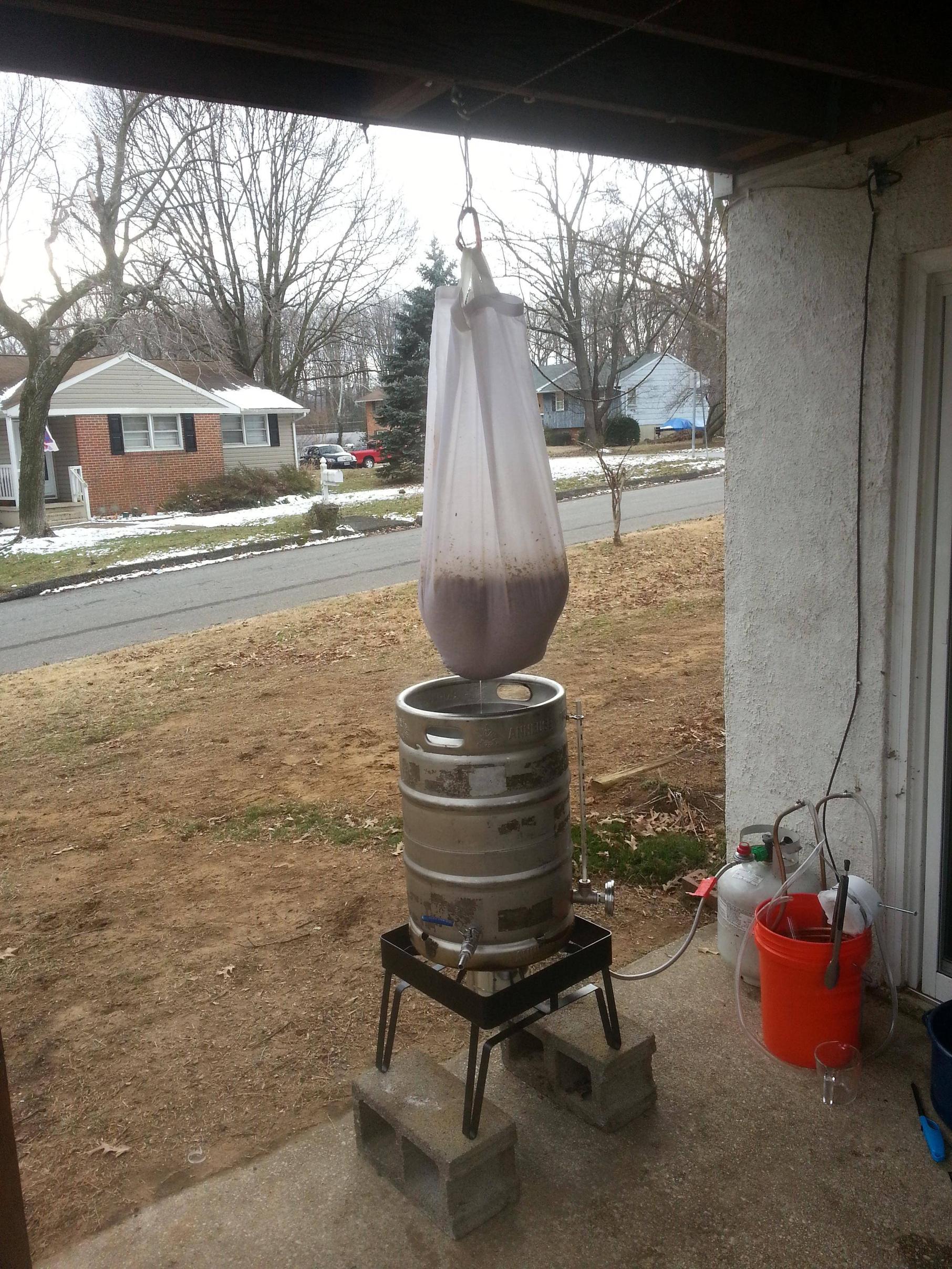fredsmedina
Member
- Joined
- Nov 10, 2014
- Messages
- 7
- Reaction score
- 0
This is my first post on here.. I have been doing a TON of reading though. so here's my issue.. I purchased from Northern Brewer..
Caribou Slobber extract Kit
Yeast: Danstar windsor ale (did not rehydrate)
Starting boil: 2 gallons of tap water (should have been 2.5 gallons, but i misread directions.)
Heres my time table of brew day:
10/27
18:40 Begin Heating Kettle
18:42 Begin Steeping grains (directions say steep for 20 minutes, or until water reaches 170 degrees)
18:51 End Steep(water reached 170 degrees. Steeped grains for only 9 minutes)
18:58 water boiling. Turn down heat. Added DME and LME without removing kettle from burner.(Newbie mistake. have removed kettle while adding malt extracts on all brews that I have done since this time.)
19:05 Water boiling again. Add Goldings Hops. Begin official boil.
19:20 Add liberty Hops
19:50 Add williamette hops
20:05 End boil. Flame-out. Begin chilling wort with copper immersion chiller.
20:35 Poured Wort into Primary (6.5 gallon glass carboy) through a funnel with no screen. Topped off with 2.5-gallons of chilled, bottled Crystal Geyser Water. Aerated wort by rocking carboy back and forth for 3-4 minutes. Took a sample to check gravity.
20:40 Pitched Yeast at 75 degrees. Sealed carboy with rubber bung and airlock.
20:45 Checked Specific Gravity. Came out to 1.052. this is EXACTLY what the directions stated it should be. (needless to say, I was pretty happy to get an exact reading on my first batch of homebrew).
by 08:00 on 10/28 (morning after brew day) the airlock was VERY active. 2-3 bubbles per second.
Over next few weeks, maintained temperatue between 65-70 degrees in a dark spare bedroom closet.
11/10 2 weeks since brew date. Specific Gravity 1.018.
So, now comes my 'problem'. I decided to taste test my un-carbonated beer. The beer tasted like alcohol definitely. but seemed very bland.. not much flavor.. I believe my huge mistake was only steeping for 9 minutes, due to a misunderstanding of the directions at the time.. I now better understand steeping, and mashing.. I should have just covered the pot at 150-160 degrees and let the grains sit for 20+ minutes.. Is this why my beer was very unflavorful?
My plans are to take another gravity reading in 3 days, and bottle it if there in no change. Is there anything I might be able to do to give it some more flavor?
Thanks for your time, and I hope somebody can give me some insight!
Caribou Slobber extract Kit
Yeast: Danstar windsor ale (did not rehydrate)
Starting boil: 2 gallons of tap water (should have been 2.5 gallons, but i misread directions.)
Heres my time table of brew day:
10/27
18:40 Begin Heating Kettle
18:42 Begin Steeping grains (directions say steep for 20 minutes, or until water reaches 170 degrees)
18:51 End Steep(water reached 170 degrees. Steeped grains for only 9 minutes)
18:58 water boiling. Turn down heat. Added DME and LME without removing kettle from burner.(Newbie mistake. have removed kettle while adding malt extracts on all brews that I have done since this time.)
19:05 Water boiling again. Add Goldings Hops. Begin official boil.
19:20 Add liberty Hops
19:50 Add williamette hops
20:05 End boil. Flame-out. Begin chilling wort with copper immersion chiller.
20:35 Poured Wort into Primary (6.5 gallon glass carboy) through a funnel with no screen. Topped off with 2.5-gallons of chilled, bottled Crystal Geyser Water. Aerated wort by rocking carboy back and forth for 3-4 minutes. Took a sample to check gravity.
20:40 Pitched Yeast at 75 degrees. Sealed carboy with rubber bung and airlock.
20:45 Checked Specific Gravity. Came out to 1.052. this is EXACTLY what the directions stated it should be. (needless to say, I was pretty happy to get an exact reading on my first batch of homebrew).
by 08:00 on 10/28 (morning after brew day) the airlock was VERY active. 2-3 bubbles per second.
Over next few weeks, maintained temperatue between 65-70 degrees in a dark spare bedroom closet.
11/10 2 weeks since brew date. Specific Gravity 1.018.
So, now comes my 'problem'. I decided to taste test my un-carbonated beer. The beer tasted like alcohol definitely. but seemed very bland.. not much flavor.. I believe my huge mistake was only steeping for 9 minutes, due to a misunderstanding of the directions at the time.. I now better understand steeping, and mashing.. I should have just covered the pot at 150-160 degrees and let the grains sit for 20+ minutes.. Is this why my beer was very unflavorful?
My plans are to take another gravity reading in 3 days, and bottle it if there in no change. Is there anything I might be able to do to give it some more flavor?
Thanks for your time, and I hope somebody can give me some insight!









![Craft A Brew - Safale BE-256 Yeast - Fermentis - Belgian Ale Dry Yeast - For Belgian & Strong Ales - Ingredients for Home Brewing - Beer Making Supplies - [3 Pack]](https://m.media-amazon.com/images/I/51bcKEwQmWL._SL500_.jpg)

















































